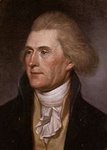...:::Analytical Essay of Jonathan Edward's “Sinners in the Hands of an Angry God”:::...
-----“Sinners in the Hands of an Angry God” is one of Jonathan Edward's most well known and 1 rousing sermons given during America's first Great Awakening. The significance of the Great Awakening and Jonathan Edward's involvement, inspiration, and intrigue in the spiritual welfare of the American people is displayed throughout the document and serves an impact not only to its own time, but still remains influential to this day in schools, universities, churches, and among the nation's finest leaders and the individuals who follow them.
-----Jonathan Edwards was born on October 5, 1703, in East Windsor, Connecticut to Timothy and Esther Edwards. He was the fifth of 11 children and his childhood education led him deep into Biblical studies1. Growing up as a Puritan evangelical, Jonathan Edwards would soon take rise to be among the most famous preachers of his time with a degree from Yale University and a devout love for God and His creation backing him up. Edwards had a fond fascination with nature and science (especially spiders and psychology) which gave him a firm advantage in his writings and sermons.
-----In 1734-1735, Edwards oversaw some of the initial stirrings of the First Great Awakening along with the boom of George Whitfield's revivals. The work of George Whitfield, greatly contributed to the Great Awakening with his immensely motivational and powerful speeches, makes Jonathan Edwards' involvement seem minute in comparison because Whitfield's presence was so widespread. On the contrary, Edwards' work did play a major role in awakening the populace in that he did not only speak in terms of “Sinners in the Hands of an Angry God, but also showed how one could seek God's perfect will in acknowledging His sovereign wrath but promise of everlasting grace.
-----Edwards was the successor to his grandfather's Church in Northampton, Massachusetts, the largest and most influential church outside of Boston. This made it all the more imperative to thoroughly convince the congregation of the intense doctrine of God's wrath and God's grace:
so that they too could know the truth and influence the nation.
-----“In Puritan theology the focus was on what God has done for us. In the aftermath of the Awakening, the new emphasis was on what man can do in response to God's great gift.”What man can do to save himself—to keep him out of the depths of hell—is nothing, according to Jonathan Edwards. A statement which gathered the attention of not only nonbelievers but also the believers themselves. “The use of this awful subject may be for [awakening] unconverted persons in this congregation.” The unconverted wouldn't necessarily mean those who are not normally church goers or considered Puritans but those who have not acknowledge that Jesus is the Lord of their lives and have no excuse for their wickedness. It seems implied that any desire to partake in sin would suggest that one is not or was never converted (saved) in the first place, nor would they have an authentic fear of God. The wrath of God would forever punish those who had brought Him displeasure in their sinfulness because their very salvation itself is faulty; they did not fear the Lord.
-----Edwards revealed that the “good state of [one's] bodily constitution, the care of [one's] own life, and the means [one] uses for [his] own preservation” have nothing to do with salvation. Those who were not blinded by the mysticism of empirical self benefit perhaps took great refuge in that their devout worship and fear of God was not in vain. For the rest, there was much trembling and fear of the very ground opening up to swallow them whole.
-----The purpose of this intense sermon would be to awake those who think well of themselves but do not fear the Lord in that they believe that God could never be so angry toward them for being a part of the elect: to show them that the Lord God is sovereign and does not take sin very lightly at all. And, wherefore, the people would respond with utmost fear of their own damnation, confirming their sinfulness and need for a savior, and to worship the Lord as new creatures with a new outlook on God, not only His anger toward their sin but also His love and mercy. Simply trusting in the covenants of grace laid out by the coming of Jesus Christ and utterly fearing the wrath of God was all that was required.
-----For many, men of God were self-righteous, condescending, arrogant, unfriendly, or argumentative.The church attendance, rituals, and regulations prompted congregates perhaps to feel they were nothing more than empty shells. Instead of sound doctrine and invitations to receive fulfilling lives in the presence of the Lord and each other, many were led to believe that being among the brethren meant nothing more than debating theology and determining who is and who is not part of God's elected people. Not that it mattered to be separate from the world, but to be fortunate enough to be allowed in church membership and partake in the holy sacraments.
-----The Great Awakening and this powerful sermon tore down the walls which before blocked the view of slaves and sinners, people in desperate need of redemption, love, and the resurrection of Jesus Christ. They needed to hear that God was angry with the natural ways of mankind; they also needed to hear, however, that God had not deprived them of His mercy. They had an opportunity to turn, to choose, to acknowledge Him and the gift of salvation to all man. Black or white, bound or free, man or women, sinner or saint, everyone had fallen short of the glory of God but everyone had a chance to give God everything and in His name be changed forever.
-----Finally, the “Tactics first used to mobilize religious groups—such as organizing committees and writing petitions and letters—also proved useful for political activities.” In awakening from the deep sleep of blissful ignorance, individuals repented, were redeemed, and resolved to become increasingly active in not only religious affairs and a more intimate relationship with God but also the affairs of the political arena. Now holding the countries leaders accountable for their actions, the people would assume men of virtue and utmost respect for God and the equality of man to be elected. “The Awakening thus fostered greater political awareness and participation among colonists.”
-----The revivals would soon tone down, the Great Awakening would soon end, but the impact it had was everlasting. This is shown by the testimonies of many individuals and the admiration of one in particular, a Jonathan Edwards of our own time so to speak, John Piper.
-----The Great Awakening developed as a theology of "total dependence" on the transformative emanations of the Holy Spirit under Jonathan Edwards. Confronting his congregation, Edwards presented two images: images of "Sinners in the hands of an angry God" against those of "the divine and supernatural light".
-----The result of such sermons during the 1730s brought society to remarkable conversion and interior reflection. This spread throughout New England in different degrees throughout the decade, with another resurgence or zeal occurring in 1742-1743.6 Without the aid of this man, his transforming words, and all the impacted lives, the world we know today could be much different. Jonathan Edwards is much more then a legendary theologian, in fact, a part of him lives amongst all who proclaim the name of Christ. Despite these things happened quite a few centuries ago, the revivals and Edwards' words still echo far into eternity revealing the greatest truth of all—God's sovereign grace and gift of salvation.













No comments:
Post a Comment